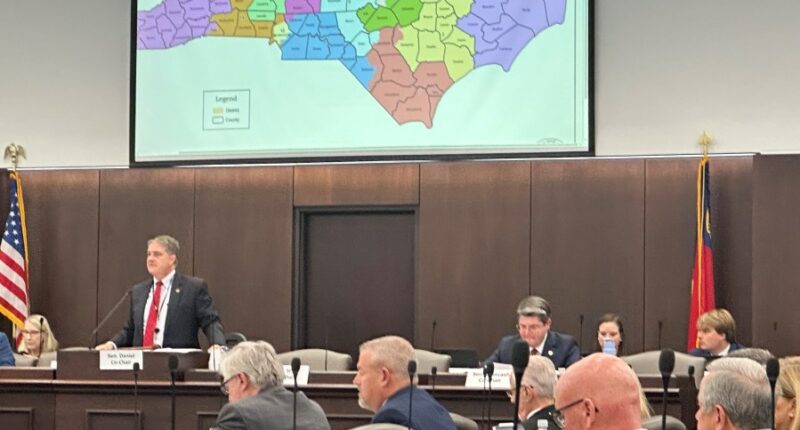Share this @internewscast.com

Former President Donald Trump has sparked a surge of unconventional mid-decade gerrymandering across states governed by both parties, urging Republicans to redraw U.S. House districts in preparation for the upcoming election.
With the Democrats needing only a three-seat gain to seize control of the House from Republicans, Trump aims to counteract the historical pattern where the sitting president’s party often loses seats during midterms through strategic redistricting.
Here’s how individual states are responding:
States that passed new US House maps
Texas: As the first to heed Trump’s call for redistricting, Texas has set the stage. Republican Governor Greg Abbott approved a revised U.S. House map on August 29, potentially boosting Republican chances by five seats. Currently, Republicans occupy 25 of the state’s 38 seats, though the new map is already facing a legal challenge.
California: Standing as the initial Democratic-led state to respond to Trump’s redistricting strategy, California’s legislature has passed a new U.S. House map. This proposal aims to override district lines set by an independent citizens commission post-2020 census, potentially granting Democrats five more seats. With Democrats currently holding 43 of 52 seats, the plan awaits voter approval in an upcoming Tuesday election.
Missouri: Missouri follows as the second Republican-led state to align with Trump’s redistricting efforts. Governor Mike Kehoe enacted a new map on September 28, which might allow Republicans to gain another seat by altering a district in Kansas City currently held by Democrats. Republicans now control six of the state’s eight seats, but the map is contested by opponents who are rallying for a statewide referendum and have initiated several lawsuits.
North Carolina — The third Republican-led state to approve new House districts sought by Trump. The Republican-led General Assembly gave final approval Oct. 22 to changes that could help Republicans win an additional seat by reshaping a Democratic-held district in eastern North Carolina. No gubernatorial approval is needed. Republicans currently hold 10 of the 14 seats. The revised map faces a legal challenge.
Ohio — A panel of elected officials who are primarily Republicans voted Oct. 31 to approve new U.S. House districts that could boost the GOP’s chances of winning two already competitive seats. Republicans currently hold 10 of the 15 seats. Redistricting was required by the state constitution because the previous map was enacted without bipartisan support.
Utah — The Republican-led Legislature approved revised House districts Oct. 6 after a judge struck down the districts adopted after the 2020 census because lawmakers had circumvented an independent redistricting commission established by voters. The revised map, which still needs court approval, could make some seats more competitive for Democrats. Republicans currently hold all four seats.
States taking steps toward congressional redistricting
Louisiana — Republican Gov. Jeff Landry in October signed legislation to delay the state’s primary elections from April 18 to May 16. The change could give lawmakers extra time to redraw U.S. House districts in case the Supreme Court overturns the state’s current congressional map. Republicans currently hold four of the six seats.
Virginia — The Democratic-led General Assembly in October endorsed a proposed a constitutional amendment allowing mid-decade redistricting in response to similar efforts elsewhere. Democrats currently hold six of the 11 U.S. House districts under a map imposed by a court in 2021 after a bipartisan commission failed to agree on a plan. The amendment needs another round of legislative approval next year to be placed on the statewide ballot.
Indiana — Republican Gov. Mike Braun called for a special legislative session on congressional redistricting to begin in November. Republicans currently hold seven of the nine seats.
Kansas — Republican lawmakers are gathering petition signatures from colleagues to try to call themselves into special session on congressional redistricting in November. Republicans currently hold three of the four seats.
States considering mid-decade redistricting
Colorado — Democratic Attorney General Phil Weiser, a gubernatorial candidate, has expressed support for a constitutional amendment to allow mid-decade redistricting. The measure would need to go on a statewide ballot. Democrats and Republicans each currently hold four seats.
Florida — Republican state House Speaker Daniel Perez has created a special committee on congressional redistricting. Republicans currently hold 20 of the state’s 28 seats.
Illinois — U.S. House Minority Leader Hakeem Jeffries and the Democratic Congressional Campaign Committee have urged state lawmakers to redraw Illinois’ districts. Democrats currently hold 14 of the 17 seats.
Maryland — Some Democratic state lawmakers have proposed congressional redistricting legislation, though the Senate president says the chamber won’t move forward with redistricting. Democrats currently hold seven of the eight seats.
New York — Democratic state lawmakers have filed a proposed constitutional amendment to allow mid-decade redistricting. The measure would need to be approved by the Legislature in two separate sessions, then placed on the statewide ballot. Democrats currently hold 19 of the 26 seats.
Nebraska — Republican Gov. Jim Pillen has expressed support for mid-decade redistricting. Republicans already hold all three House seats but could try to shore up a competitive district that includes Omaha.

















